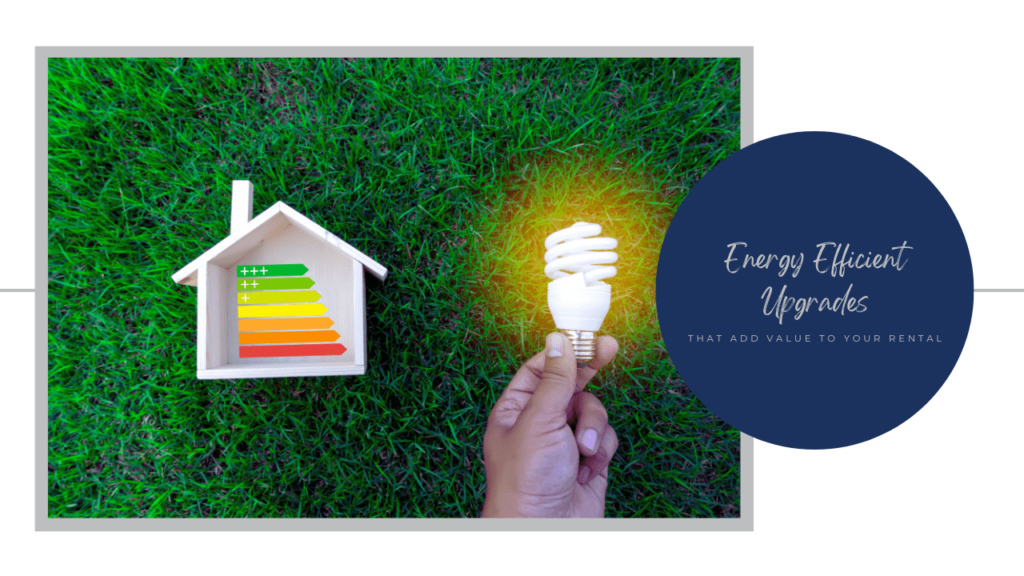
How often do you think about the amount of energy that your rental property consumes?
Whether you’re an ardent environmentalist or someone who rarely thinks about energy consumption at all, we can tell you that conserving energy is on a lot of minds these days. You’ve seen the gas prices. And, a lot of modern tenants today feel a sense of urgency when it comes to environmental sustainability. There’s a real trend towards embracing a greener lifestyle. But it’s about more than that. It’s also simple economics. The cost of basic services and utilities continues to rise, and just about everyone wants to save on their electric and water bills whenever possible.
Some Science:
|
According to the National Academy of Sciences, residential energy consumption accounts for almost 20 percent of U.S. energy-related greenhouse gas emissions. And, a Harvard study found that rental properties use more energy than owner-occupied properties. |
We believe that the rental industry can probably do better when it comes to energy efficiency. It’s not only good for your tenants and your property, it’s good for your bottom line as well. Energy-efficient appliances, light bulbs, and systems may require an initial investment, but those things will contribute to the value of your property. You’ll have an easier time attracting and retaining high-quality residents.
Two goals are driving this blog:
- First, we want to dive into some of the benefits of investing in these types of upgrades in your rental property.
- Then, we want to give you some advice on which types of energy-efficient upgrades make the most sense for you as a Roanoke investment property owner.
First and Best Benefit: Attracting and Retaining Happy Roanoke Tenants

Maybe your tenants set up their own utility accounts and maybe you pay the utilities and bill the tenants. You always pay the utilities during turnovers and periods of vacancies.
What we’re trying to say, is: energy savings benefit the both of you.
And, the benefits go well beyond the money you’ll save on lower electric, gas, and water bills.
You’ll also be able to use your energy-efficient systems and appliances as a selling point when you’re marketing your rental property. This will set you apart from other rental homes on the market, and you’ll be a more attractive option, especially for tenants who are conscious of their carbon footprint.
Today’s tenants are looking for a property that doesn’t waste energy. Younger tenants are especially more mindful of sustainability and energy conservation.
Tenants looking for a home in Roanoke will notice the improvements that you’ve made, even if they’re minor. Those LED lights will be preferred over the incandescent bulbs. They’ll appreciate the programmable thermostats, not only because of the potential savings, but because they can feel good about not causing further harm to the earth.
Not only will you attract a larger pool of tenants, you’ll be more likely to retain them. Your residents will want to continue living in a forward-thinking property.
$ Tenants Appreciate Saving Money $
As you probably know, more and more tenants are working from home. Remote work has taken hold, and if your tenants are not working full-time from home, they’re likely spending more time there than in the office. That means they’re at home more frequently, using the electricity and the water and maybe the gas, too.
Increased usage can mean increased energy bills.
Unless you invest in energy-efficient systems and upgrades.
When your appliances, systems, and amenities are helping tenants to lower their bills without using less of what they need, those tenants are happy with where they live. Tenants, even while trying to conserve energy, will still need heat in the winter. They’ll still require hot water for their showers, even if they’re taking shorter showers.
We recommend that while you’re making these changes, go ahead and educate tenants on what they can do to reduce their own energy consumption and what they pay. Direct them to the U.S. Department of Energy website.
On that website, tenants can find great resources on how to set a thermostat for maximum efficiency, when to keep the lights off, and how it’s important to disconnect unused equipment and electronics from a power source.
It’s valuable, actionable information, and when you can complement those recommendations with a dishwasher that uses less water or upgraded landscaping to allow for natural light in the property, you’re providing a real value to your residents.
Second Benefit to Energy Efficiency: Protecting Property Value
 There’s another great reason to turn your rental property into an energy-efficient home: you’ll have an easier time with preventative maintenance. Your property’s value will continue to grow.
There’s another great reason to turn your rental property into an energy-efficient home: you’ll have an easier time with preventative maintenance. Your property’s value will continue to grow.
Energy-efficient appliances, lighting, and other systems will prevent the expedited deterioration of your investment. It will delay the build-up of condensation in your air conditioning unit. It will protect your property from mildew and mold growth. Opting for energy-efficient appliances can preserve your home, especially when the home is left empty during vacancies or when your residents are out of town.
Investing in environmentally sound solutions designed to conserve energy and limit greenhouse gas (GHG) emissions will make your property more valuable, now when you’re establishing rental values, and when you decide to sell it. In the future, these types of upgrades will be expected. It won’t be an option. Why not get ahead of the curve now, and position yourself as a leader in providing sustainable rental homes?
Third Benefit to Energy Efficiency: Comfort and Quality
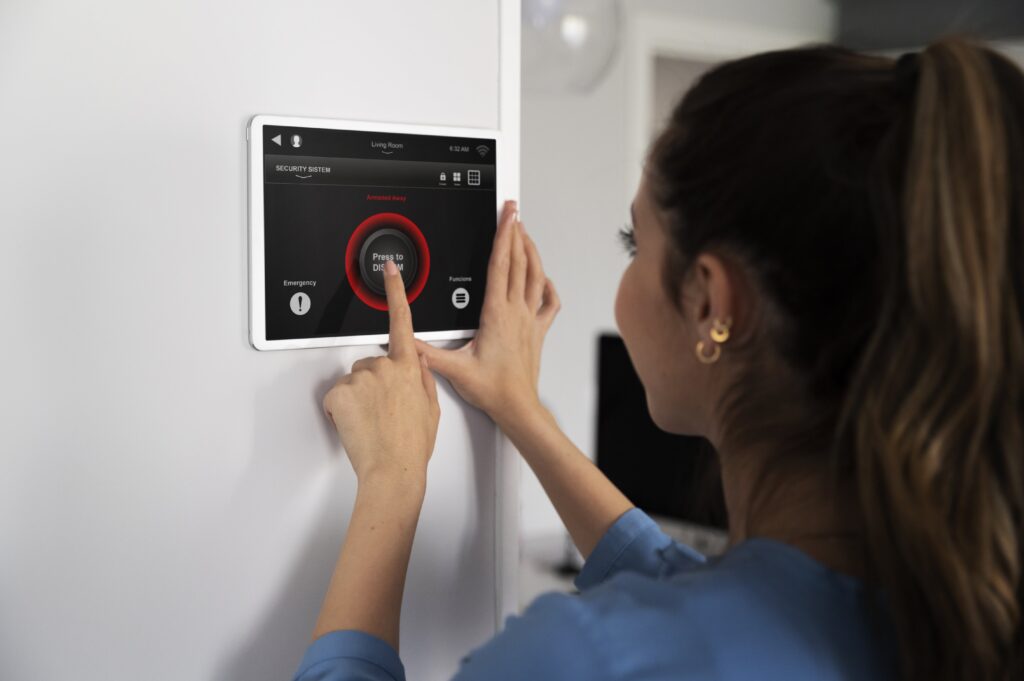
You care about your tenants and you want to give them a comfortable, high-quality home to live in.
These upgrades will help.
Many of the energy-efficient steps that we’re about to propose, such as improving insulation, increasing the quality of air flow, and utilizing smart thermostats to help maintain room temperatures, can make your home more comfortable to live in. Think about the joy of a ceiling fan in the bedroom; who doesn’t love falling asleep to air that’s moving? That ceiling fan can also help rooms feel cooler without adjusting air conditioning settings. On-demand water heaters save energy and decrease worry about running out of hot water during high usage.
Air quality is more important than ever, especially when you have tenants who are battling asthma, allergies, and auto-immune issues. Some energy efficiency upgrades can help you use heating and cooling systems less frequently. They’ll also improve the ventilation in your property. This can mean improved air quality for your rental home, which tenants are looking for when they decide where to live and whether to renew a lease agreement.
What Types of Energy Improvements are Best for Your Roanoke Rental Home?
 Where should you focus your resources when you want to improve the energy efficiency at your rental property?
Where should you focus your resources when you want to improve the energy efficiency at your rental property?
That depends on your property.
Start with an energy audit.
This audit will tell you where you stand with what you currently have going on at your rental property. An energy audit can identify a rental property’s energy vampires and provide a reasonable and cost-efficient starting place for cutting energy usage at scale.
Your energy audit can provide you with the data you need to make good decisions.
This can be a useful analysis in identifying the sort of human behavior that needs an upgrade. It can also show you which systems, appliances, and functions inside your investment property need an upgrade.
You cannot improve what you are not measuring.
Some Potential Upgrade Options
Insulation
|
Keep Heat and Air Inside Insulate your Rental Home Good insulation keeps energy bills down. Insulated walls, floors, and roofing can help reduce the amount of heat that escapes during cold weather and can also trap cool air inside during hot weather. If you think about heat, it’s constantly in motion. It moves freely from warmer to cooler areas, so its nature is to constantly seek escape from a warm interior out to a cool exterior. Whether it’s winter or summer, lots of energy is lost simply by heat and cool air moving through walls and out through doors. Cut down on this escape of heat at your rental properties with good insulation inside the walls. This will provide a higher heat flow resistance (also referred to as an R-value). A well-insulated property also allows your HVAC to operate more efficiently. This, in turn, will consume less energy. Insulation can be made from different materials like fiberglass, cellulose, or foam. Most experts recommend that for maximum insulation efficiency, spraying foam at your rental property is the way to go. |
Caulking and Sealing Reinforce Your Windows and Doors Always take a look at your windows and doors when you’re working to improve the way your property conserves energy. Nearly every energy audit will recommend better caulking and sealing. In addition to insulating your roof and your walls, you want to make sure air is not escaping through windows and cracks in doors. Caulking is one of the best and easiest ways to ensure your property is as efficient as it can be. Good news about caulking and sealant: they’re inexpensive. Older rental homes will require more of an effort than new construction when it comes to making the place energy-efficient. If your property is old, you might discover old or missing caulk around your windows. Air will leak through those areas, just as it will leak through sashes, door panels, and window frames. Seal off any cracks or gaps with caulk. |
Educate your Tenants on Energy Vampires
Turn Off Those Electronics
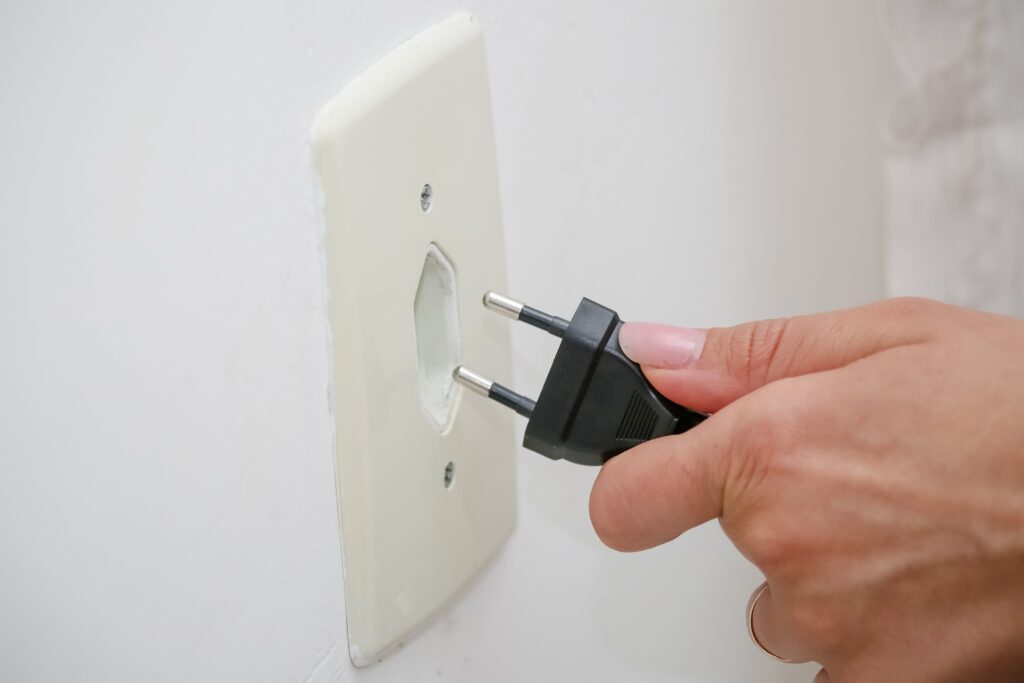
Have you ever heard about electronics being energy vampires?
These vampire devices are typically electrical appliances that drain power even when they’re not in use. Usually, they are left on standby or they’re not being operated, but they’re still plugged in. Here’s an example: you might turn off your television so that there’s simply a black screen staring back at you. But, if the red standby light is still on, that television is still sucking in energy.
One of the simplest ways to increase energy efficiency is by turning off and unplugging devices when they are not in use. You can educate your tenants on this simple act, and ask them to think about how they can be more responsible with energy as they’re living in your home.
This is called standby energy, and a lot of organizations have raised the alarm since most people don’t realize how much energy these devices actually use. Unplugging them altogether can have a significant impact.
To make things easier, recommend that your tenants install smart power strips to help automatically power off devices when not in use. These strips have money-saving and material outcomes such as:
| Protecting property
Power strips can protect your tenant’s electronic devices from power surges, especially if there’s lightning. Thunderstorms are not uncommon in Roanoke, especially in the summer, so this extra layer of protection is important. |
Reducing electric bills.
Phantom charges are the result of standby energy intakes and vampire electronics. You don’t know you’re using the electricity but you’re still paying for it. Tenants may not know about this, and you can refer them to the U.S. Department of Energy website for more information. |
Reducing consumption costs.
Tenants will pay less with power strips keeping them from powering up devices that they’re not using. Tenants who are more concerned with the environmental impact of how they live will enjoy knowing that they aren’t using more energy than they need. |
Make sure you’re turning things off that you don’t need during turnover and vacancy periods as well.
Upgrade Idea: Invest in a Smart Thermostat
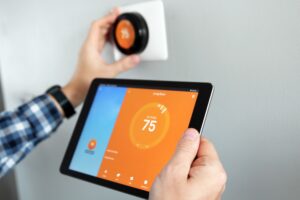 It’s easy – start with a smart thermostat.
It’s easy – start with a smart thermostat.
A smart thermostat is a Wi-Fi enabled device that automatically adjusts heating and cooling temperatures inside your property for optimal performance.
While system designs may vary, common smart thermostat features include convenience. Smart thermostats can learn your tenant’s temperature preferences and suggest a schedule that will automatically adjust to temperatures that save energy, depending on whether the tenant is sleeping or outside of the home.
Wi-Fi enabled thermostats also allow tenants to control their home’s heating and cooling remotely through a smartphone.
Smart thermostats are also handy when you want to review data on energy usage. They can provide equipment use and temperature data you can track and manage. Periodic software updates ensure your smart thermostat is using the latest algorithms and energy-saving features available.
Smart thermostats that earn the ENERGY STAR label have been independently certified, based on actual field data, to deliver energy savings.
Heating and cooling costs are the largest energy bills that your tenants likely face. You can find a programmable thermostat that’s reliable and sustainable for less than $100. And, it will make a big difference for your residents.
Check Your Appliances. And Your Lights
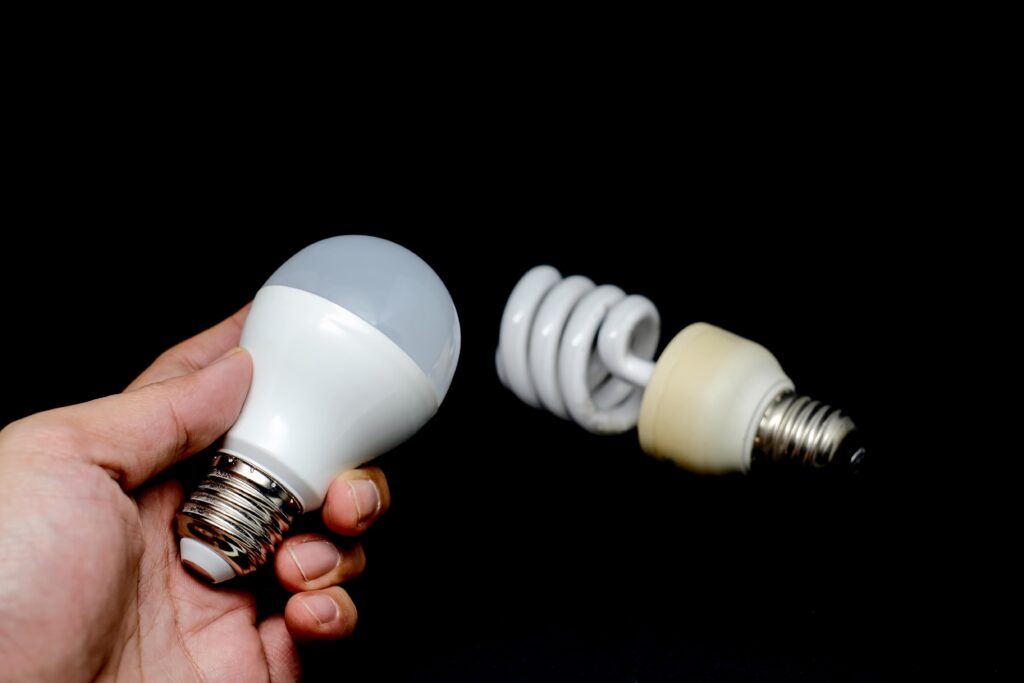
Don’t wait too long to switch out your old, energy-draining appliances for new, energy-efficient appliances. Invest in some good and reliable models that are energy star-rated. These use less energy than non-certified models, and they can help your tenant save money on electricity bills and use less water and electricity.
Energy-efficient lighting, such as LED bulbs, use less energy than incandescent bulbs and are longer-lasting, making them cost-effective in the long run. These bulbs are also less expensive now than they were years ago, so you don’t have to make a huge investment when you’re trying to bring more efficient lighting to your rental property. This is another quick and easy switch you can make that will hardly impact what you spend right now.
Make Preventative Changes to Appliances
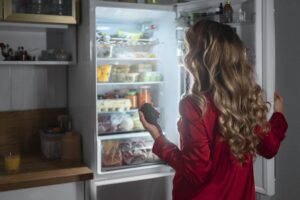 Your dryer and your refrigerator could be consuming more electricity than you realize. If you provide these appliances in your rental property, you’ll want to make them as efficient as you can for appreciative tenants.
Your dryer and your refrigerator could be consuming more electricity than you realize. If you provide these appliances in your rental property, you’ll want to make them as efficient as you can for appreciative tenants.
How do you make your existing appliances more efficient? We’re glad you asked.
| Hot water heater settings
Install a tankless water heater for maximum efficiency. If you’re not ready to replace your traditional water heater, check the temperature setting. The default setting for most water heaters is 140 degrees. It’s safer to turn it down to 120 degrees, and that’s also going to save energy. Never set the hot water heater below 110 degrees, or you invite bacteria into the system. |
Clean those refrigerator coils
After your energy audit or during a turnover, pull the refrigerator in your rental property away from the wall. You’ll likely find that the coils behind the fridge are covered with dust. Cleaning your coils will reduce the refrigerator’s energy consumption, help the appliance operate more quietly, and extend the lifespan of the fridge. |
Furnace filters
Your tenants may be responsible for changing air filters. Make sure they’re taking this responsibility seriously and committing to routine filter changes. Clean filters keep the air in your rental home cleaner. They also ensure the furnace and the air conditioning units are running efficiently. The HVAC unit will continue operating the way it should, and utility costs will be lower. |
This is what we have to say about energy efficiency and your rental property.
Would you like our specific recommendations for your unique rental home? Please contact us at Lawson Realty Group whether you’re a new investor or an experienced real estate owner. We manage properties in Southwest Virginia throughout the Roanoke Valley, including Salem, Cave Spring, Hollins, Vinton, Glenvar, and Southwest Roanoke County.
